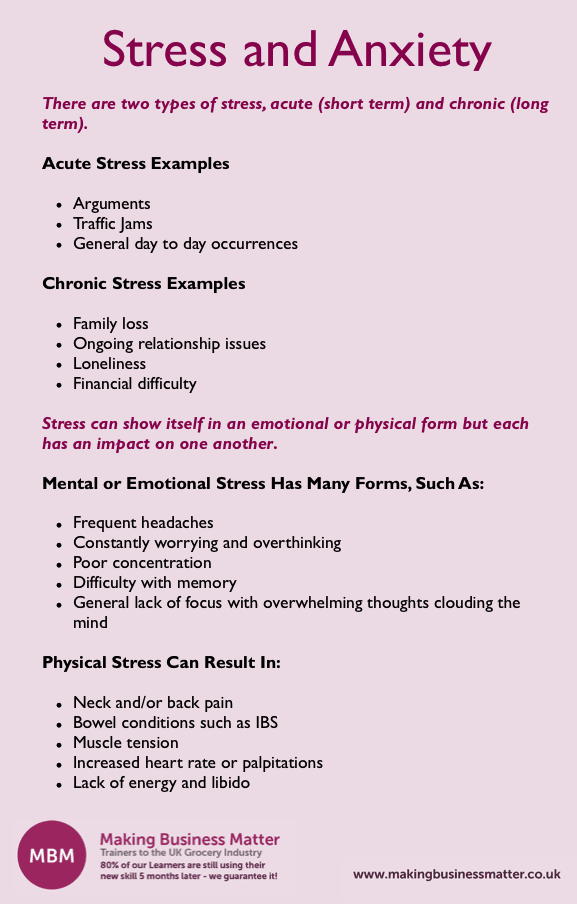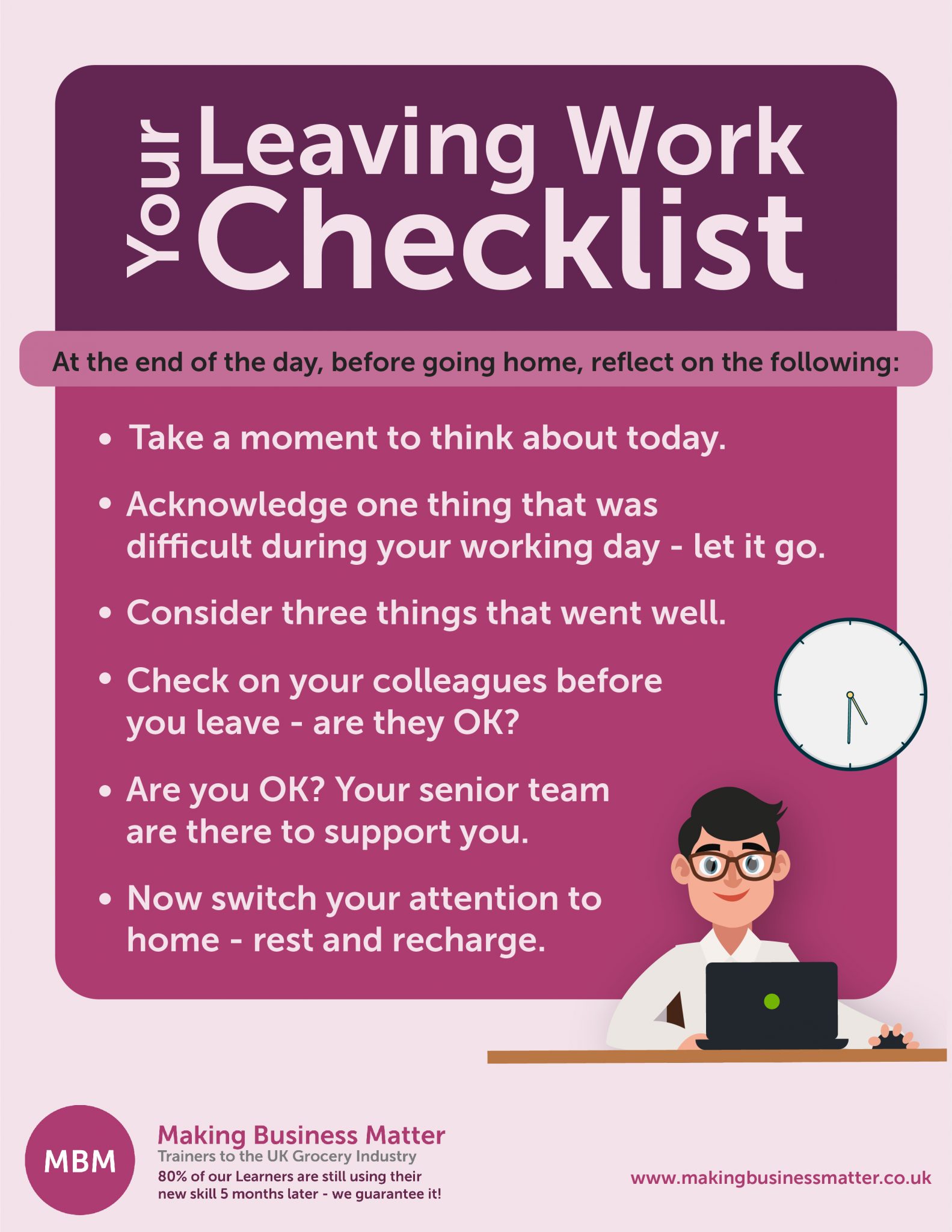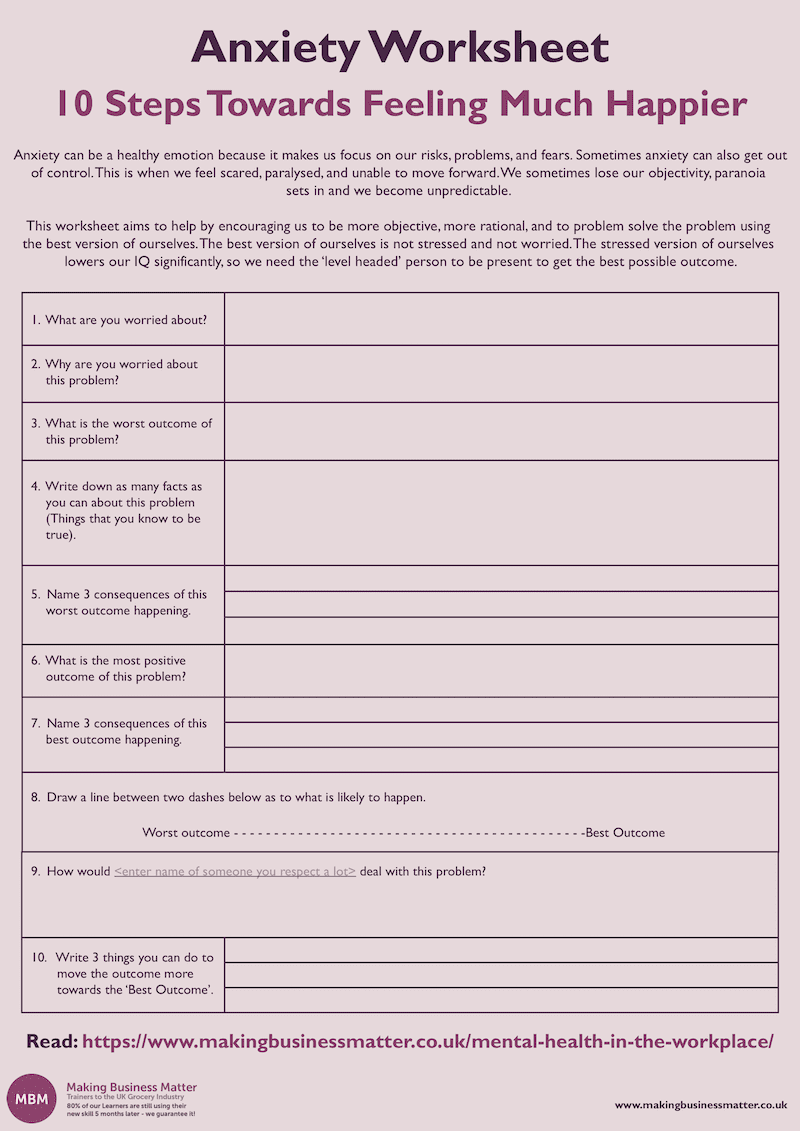Mental Health in the Workplace
Many of us think we understand mental health but do we actually know what it is? Do we know how it can affect individuals? Are we aware of ways we can help or make a positive influence at home or in the workplace?
Throughout this article, I will try to help you better understand mental health in the workplace, offer ideas on ways you can help either yourself or others, give simple tips and techniques that may help deal with challenging situations and ways to recognise if someone is struggling to cope.
What is Workplace Mental Health?
Workplace mental health is a state of mind in your everyday working life. It is the way we think and feel. It is our ability to deal with good and bad situations. With so many jobs and different types of people, it is easy to see not everyone is suited to the same role. Whilst some thrive on pressure and deadlines, others prefer a calmer and more controlled environment. No matter what job we have, we will all experience tough times where we feel out of our depth, overwhelmed like we can’t move forward and just don’t know what to do! This isn’t always purely related to work and our personal life and outside influences can play a big part in how we cope at work.
Strategies to Improve Mental Health at Work:
As human beings, we learn and react in all sorts of ways and no two people are the same. There are many ways we can improve our workplace mental health, however, it is important to remember that what works for you won’t necessarily work for your friend or colleague.
Listed below are a few easy tips/techniques that you can try to improve your workplace mental health:
1. Eat Well
- I know everyone says it, but it really does make a difference. If you eat a healthy diet, it makes you feel cleaner, lighter and more energised.
- Prepare your food. If your workplace doesn’t cater to healthy eating then prepare meals at home or buy food to take in a few days before.
- Eat your lunch away from your desk where possible and if you need to snack, have fruit, nuts and other healthy options with you.
- Cut down on caffeine and sugary drinks then increase your intake of water-based fluids.

2. Get Up and Move
Don’t sit at your desk all day! If you’re in the same office, get up and talk to your colleagues instead of sending an email or making a phone call; you will build better relationships and improve team building. We spend more time at work than anywhere else so why not make it fun, with positive experiences and enjoy each day given.
3. Manage Your Time and Add Structure to Your Day/Week
However many goals you may have, write them down. Number them in order of importance and plan your steps to reach the end for each one. Don’t have more than five goals at any one point in time and don’t put pressure on yourself and give unrealistic timeframes.
4. Ask for Help, Advice or Guidance
Remember tip two? By doing this, it will give you the confidence to ask for advice or guidance from others as you will have established solid relationships. Communication is key; conversations add different perspectives and help you move forward.
5. Be Positive
Although it can be hard, if you find a positive thought for challenging situations, you are more likely to achieve your goal or just enjoy your work a little more. No matter what life and work throw at you, there is always a positive to be found; you just need to find it!

Stress and Anxiety
These are the biggest contributors to workplace mental health illness. Stress is a response to some kind of threat or challenge in different situations that make you feel extremely uncomfortable, whilst anxiety is a reaction to the stress.
It can be difficult to spot the difference between stress and anxiety as both can lead to not sleeping and feeling constantly tired, not focused, feeling negative, generally irritable and out of sorts.

It is important to note that everyone has different stress triggers but work is the most common, some of which are:
1. Unhealthy Relationship with Your Manager
Relationships are vital to positive workplace mental health. Tackle conflict and differences you may have head on, ensuring you maintain professionalism at all times. Be open and honest but remain positive and try to reach an agreed outcome.
2. You Have Too Much Work with Unrealistic Deadlines
Something has to change; remember point three from earlier? Use this to help and where necessary have an open and honest conversation with your manager.
3. Insecurity About Your Position Within the Team or Company
If you’re worried about the security of your role in the organisation, have an honest conversation with your manager or HR department.
4. Discrimination or Harassment
Speak to your manager or start a grievance procedure with the HR department. This is unacceptable and needs to be addressed. We are all unique, different and diverse in the workplace should be embraced and harnessed.

Keep an Open Dialogue
You should see by the above few bullets that communication is imperative and the key to success. If you or someone you know are struggling with work, have a conversation but make sure you actively listen. If the conversation is with your manager, even if the outcome is not as expected, you know where you stand and can plan for the future.
In most situations and especially in today’s society, managers are more equipped and supportive in dealing with someone suffering from a workplace mental health illness such as stress or anxiety. They can review workloads, hold regular catch up sessions or if needed, refer you to an Employee Assistance Program (EAP) if they have one. Most companies do have EAP schemes, however, if they don’t, they can help by being flexible with doctors’ appointments and where necessary, ongoing therapy sessions.

Anxiety and Depression
Although stress is not a recognised medical condition, in extreme circumstances, it can lead to depression or anxiety and these are recognised. Anxiety and depression are different illnesses but have similar elements. They tend to go hand in hand and, from a mental health perspective, are known as the fraternal twins of mood disorders.
Even the worst sufferers of chronic stress, anxiety or depression should try to remain in work. It may mean you need to work reduced hours for a period of time. However, if you find the right balance and have a supportive manager and working environment, work can give you the focus and direction you need to remove negative thoughts. Moreover, by practising different techniques, you can be an effective and successful employee. Techniques you could try to improve your workplace mental health and reduce anxiety and depression are:
1. Time Management
Like before, plan your day and set small realistic goals with achievable deadlines.
2. Meditate and Be Mindful
Practise breathing, read, listen to music or just be silent and aware of your surroundings.
3. Be Grateful
Remind yourself of the things you have achieved and recognise your journey in getting there.
4. Help Others
Being kind makes us naturally feel good; reach out to someone and be that ear they need or the voice of reason in a lost period of time.
5. Be Positive
Positivity breeds positivity! It is infectious so no matter how hard it is – find that positive thought.
6. Accept Things You Can’t Change
If you can’t change something accept it and move on. Don’t waste your thoughts on something out of your control; there is no point in staying in the past.
It could be that you just need to change your job to help eliminate some of the pressures contributing to your mental health. Most people with a mental health condition are able to work. It may take time to work out what the right job is but, if I’m honest, I believe it doesn’t matter what you do as long as you are happy and have the right work/life balance for you.
Free Worksheet:
Explore how you can take ’10 Steps Towards Feeling Much Happier’ with our Anxiety Worksheet. Click the image for a higher resolution:

Final Thoughts
Working is very important for mental health sufferers. Yes, it may be hard, but nothing worthwhile is easy. When people focus, have the right support, can find the strength from within, remain positive and determined, anything is possible!
More organisations are supporting mental health in the workplace by investing in their staff to attend a mental health first aid course. Why not be the person who promotes mental health and actively talk about ways to help make a difference. Ask to attend the mental health first aid course.
A majority of us know someone who suffers from a mental health illness, no matter how big or small it may be. We can each make a difference by supporting mental health at work and being that person to care for others.




